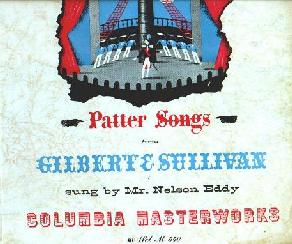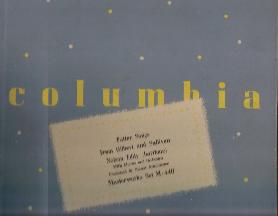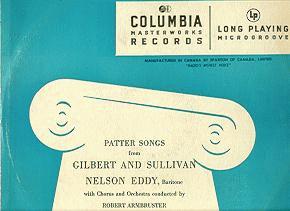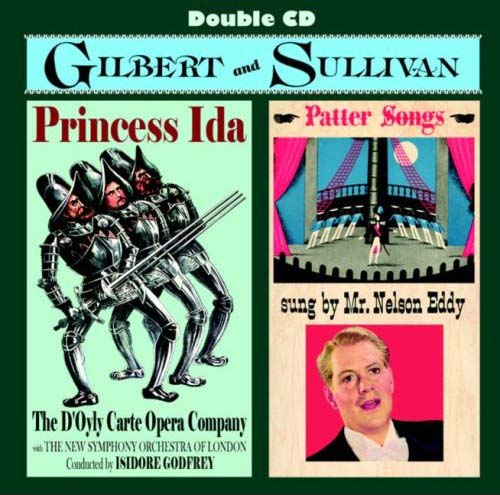Nelson Eddy: Patter Songs from Gilbert and Sullivan
Baritone soloist, Nelson Eddy
Chorus and Orchestra cond. by Robert Armbruster
Recorded 28–29 Nov. 1940 and 9 April 1946
 Columbia M-440 |
 Columbia M-440 (Older Version) |
 Columbia ML-4027 (Partial Scan) |
This set of patter songs recorded by Nelson Eddy has achieved almost legendary status, and it seems to have been extremely popular from the beginning. A first batch of songs was issued in 1941 on 78rpm records. A second volume was issued in 1948 on 78's. There was also an LP comprising the contents of both volumes and a CD re-issue in 2007.
Eddy was known primarily as an opera singer. In an earlier version of this page, I stated that he had never sung any G&S, but Darryl Winston (a representative of the Mac/Eddy Society) and Eleanor Dugan (owner of the Nelson Eddy web site) set me straight: Eddy did sing Strephon, the Major-General and the Pirate King — though none of them for very many performances.
You wouldn't know his G&S background from these performances, however. While it seems he could have been an excellent patter baritone if he wanted to, many of the recorded selections betray an atrocious sense of comic timing. A few of the items are quite good, but others are awful. Eleanor Dugan, who wrote a book on Eddy, agreed:
I must say that I totally agree with you about this usually compulsively workaholic artist's failure to give full value on these recordings. My suspicion is that he had hit a period in his life when he desperately needed money and made far too many records without proper preparation. When he selected songs for his concerts and radio broadcasts, he obviously cared deeply about them and got full measure, but some of his albums (G&S, Stephan Foster, etc.) appear to have been dictated by the recording studio. He simply showed up, sang, and cashed the check.
Among the better selections, "When a felon's not engaged in his employment" has just the right dry sense of humor. In "When e'er I spoke sarcastic joke," he actually sings the right pitches — something few patter men do in this song — while punctuating the rests with wry ad-libs. At the other end of the spectrum comes "Am I alone and unobserved," a notoriously tricky song even for more experienced G&S singers, which here lacks any sense of characterization.
 AVID AMSC898 |
Many of the songs suffer from Eddy's decision to speak entire verses. It is clearly not that he can't sing the notes. It seems he just decided this was funny. True enough, a skilled performer can add emphasis by speaking occasional words, but when a whole verse is spoken, the effect completely loses its appeal. "My boy you may take it from me" is a song that is particularly marred by an excess of speaking, as is "A private buffoon."
A number of songs are introduced by a brief snippet of dialogue from the opera, enough to show that Eddy is no actor. He sings with a gorgeous baritone and makes all the words heard, although the conductor quite noticeably slows down in lots of places so that Eddy won't have to patter too quickly. Eddy apparently was working from old scores. He begins the Major-General's song with "I am the very pattern...," and he says "chassepôt rifle" in the third verse.
Warwick Don has a more favorable reaction, and he also filled in the recording history:
I agree with your general assessment: Eddy is more at home in some songs than in others. However, perhaps being less of a traditionalist than some, on the whole I really enjoy most of them. I have never got the impression that he over-talks in some of them.
Some additional points: According to Larry Kiner's Nelson Eddy—A Bio-Discography (The Scarecrow Press, 1992), the recording session for the first album (M-440, 78 rpm) was held 28–29 Nov. 1940 and the album released 12 Feb. 1941. The second record session (album M-670, 78 rpm) was held 9 April 1946 and the album released 14 April 1947. (Kiner lists only two songs — "Rising Early in the Morning" and "When I Good Friends" — he must only have been able to obtain information on these two.) There is an obvious difference in sound dynamics between the two recording sessions and the players in the orchestras do not correspond (only the conductor is the same — Robert Armbruster); nor do the instruments match up exactly in number and kind.
According to Kiner, Columbia LP ML-4027 was released 28 June 1948.
I have to take issue with Eleanor Dugan's comments concerning Eddy's Stephen Foster recordings. Far from him simply showing up, singing and cashing the check, the records reflect careful production — attention to detail and unadorned but excellent renditions of not only the more familiar songs but some of the more obscure songs as well. It is high time these recordings were issued on CD. I have to say it has never occurred to me that Nelson Eddy was ever less than meticulous when fronting the recording microphone. He was ever the true professional.
The contents of the two 78rpm issues are listed below (the LP and CD consisting of the sum of the two):
|
Patter Songs from G&S Columbia Album M-440 |
Patter Songs from G&S, Volume II Columbia Album M-670 |
|---|---|
|
|
| Date | Label | Format | Number | Comments |
|---|---|---|---|---|
| 12 Feb. 1941 | Columbia | 78rpm | M-440 | Volume I |
| 14 April 1947 | Columbia | 78rpm | M-670 | Volume II |
| 28 June 1948 | Columbia | Mono LP | ML 4027 | Includes the contents of 78rpm volumes I and II |
| 22 May 2007 | AVID | CD | AMSC898 | Includes 1955 D'Oyly Carte Princess Ida |
